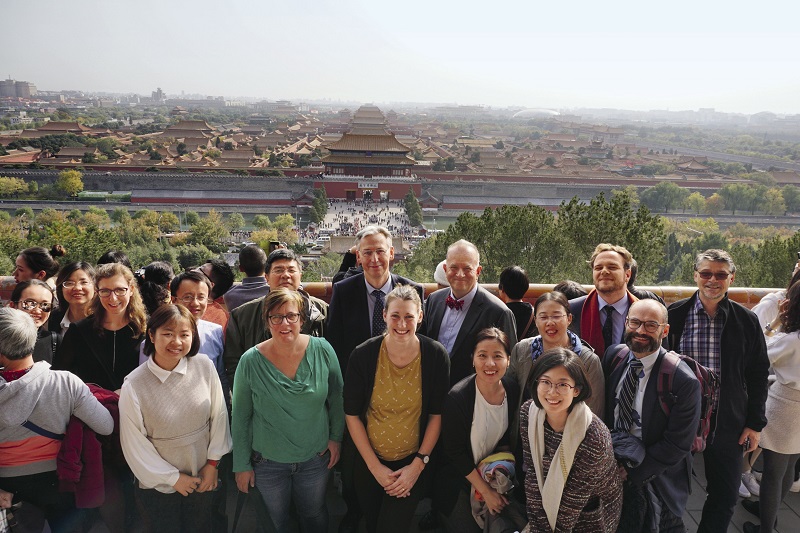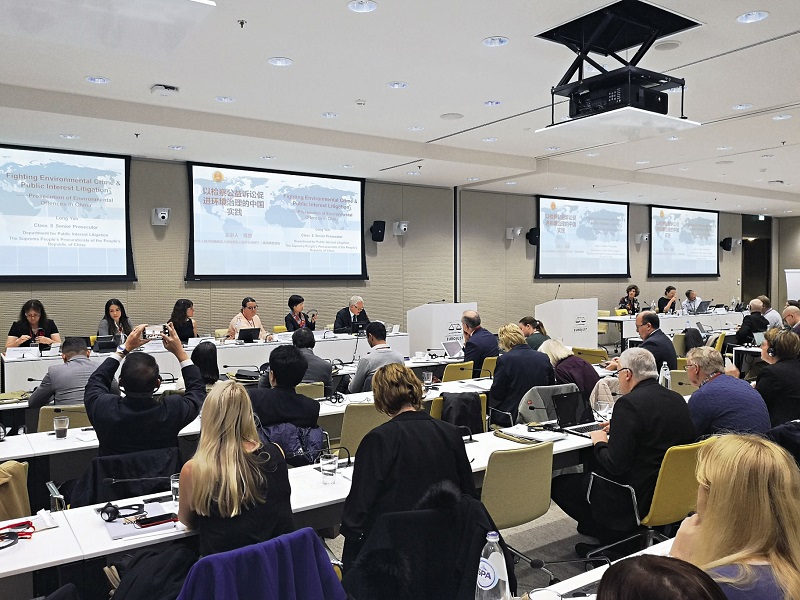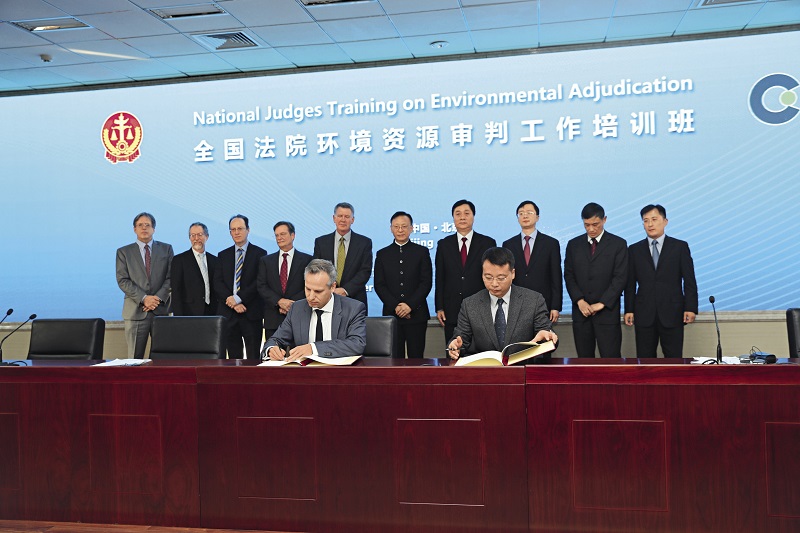The EU and China are stepping up their efforts to tackle environmental challenges, seeking to achieve a green economic recovery.
Dimitri de Boer knows a lot about advancing environmental rule of law and rising to environmental challenges. As chief representative of the China office of NGO ClientEarth, he focuses on issues ranging from pollution control to biodiversity protection, climate change and a green post-pandemic economic recovery.
Founded in 2008, ClientEarth is an environmental law charity with offices in London, Brussels, Warsaw, Madrid, Berlin, and Beijing. In China it focuses on advancing the environmental policy dialogue between the EU and China, supporting the drafting and revision of environmental laws and regulations in China, building the capacity of environmental judges and prosecutors, enhancing public participation in environmental protection, and greening China’s overseas investments.
Born in the Netherlands, de Boer is proficient in multiple languages including Chinese, and he has always had a great interest in Asia, starting when he was a teenager. “China is such an important country, with a rich culture and long history, and a rapidly developing economy. I visited Yunnan in 1999, and decided that one day I should spend a few months to learn Chinese in Beijing,” he said. In 2002, he did just that.
The next year, de Boer started working in China for the United Nations Industrial Development Organization (UNIDO). “Environmental protection is the foundation for sustainable industrial development. Gradually, I shifted my job focus to environmental policy, and then on to environmental governance and law, and the role of social organizations and the public to participate in environmental protection,” he said.
In 2014, he was selected by the EU delegation to lead the EU-China Environmental Governance Programme, which was embedded in the Policy Research Center for Environment and Economy (PRCEE) of China’s Ministry of Ecology and Environment. When the programme ended, he subsequently started ClientEarth’s China office in 2016.

Government officials invited by ClientEarth take a group photo in Beijing during the third EU-China Biodiversity Workshop in October 2019.
EU–China Policy Dialogue
In ClientEarth’s Beijing office, there is a nice video conference room. De Boer said, “Due to the pandemic, many exchange visits have been cancelled, so we shifted to do more joint studies, and we host many virtual conferences with experts in Europe.”
The first phase of the EU-China Environment Project was officially launched in January 2018. Funded by the European Union, the project supports the environmental policy dialogue between China’s Ministry of Ecology and Environment and the EU Directorate-General for the Environment, and provides a platform for exchanges between environmental policy makers and experts. It is jointly implemented by PRCEE, together with ClientEarth, and the German consulting firm GOPA.
De Boer is the team leader of the project. He said that during the first phase which ended in June 2021, they carried out various activities and made substantial progress, such as successful dialogue on how to protect global biodiversity, and on how to achieve a green economic recovery. “A green economic recovery has become a new priority. We must use this economic stimulus as an opportunity to move away from business as usual, and to address biodiversity loss and climate change in the post-pandemic world,” said de Boer.
The conclusion of the first phase of the EU-China Environment Project coincided with the launch of China’s 14th Five-Year Plan (2021-2025), which places an even greater emphasis on environmental ambitions, including on realizing China’s pledge to peak carbon dioxide emissions before 2030 and achieve carbon neutrality before 2060. At the same time, the European Green Deal, released at the end of 2019, renewed the EU’s commitment to achieving net zero emissions of greenhouse gases and to decoupling economic growth from resource consumption by 2050.
“Despite disruptions caused by the pandemic, both sides have stepped up their efforts to tackle environmental challenges and readjust priorities in response, paving the way for a green post-pandemic economic recovery,” said de Boer, noting that the second phase of the project started in July 2021.
One of the next big topics in the EU-China project will focus on how to ensure that our supply chains don’t end up causing deforestation in third countries. This is becoming a major priority, as every year huge areas of tropical rainforests are converted to the production of commodities like soy, palm oil, beef, pulp, and paper, etc. This is the primary driver of global biodiversity loss, and is undermining Mother Earth’s natural ability to regulate the climate.

Facilitated by ClientEarth, a delegation of Chinese prosecutors participates in the annual meeting of the European Network of Prosecutors for the Environment (ENPE) in November 2019.
Court Cases
According to de Boer, his team was not just a witness, but also a partner of the Chinese government in environmental efforts over the years. Some of China’s progress include the revision of the system of environmental laws, bringing air and water pollution under control, the start of carbon trading, the ability for NGOs and prosecutors to bring cases to protect the environment, a 10-year fishing ban in the Yangtze River basin area, delineation of ecological conservation redlines, and much more.
ClientEarth focuses on environmental laws, and therefore has a particularly active cooperation with the Supreme People’s Court, and the Supreme People’s Procuratorate. “Case study is of great value to judges,” said de Boer, adding that although judicial systems vary in different countries, many of the environmental problems that judges and prosecutors deal with are similar. Through sharing stories of specific cases, judicial professionals from around the world can learn from each other and find solutions to common challenges.
In October 2021, on the occasion of the 15th meeting of the Conference of the Parties to the United Nations Convention on Biological Diversity in Kunming, southwest China’s Yunnan Province, ClientEarth published a brochure titled 10 Landmark Cases for Biodiversity, which was a popular read among attendees. The first of those cases was a story of a recent ruling in China, which saved the habitat of the endangered green peacock.
Yunnan, China’s second largest producer of hydroelectric power, prides itself on being one of the most biodiverse regions in the country. The green peafowl, critically endangered in China and whose last remaining habitats are mainly in Yunnan, is comparable to the national treasure status of the giant panda. However, the proposed Gasajiang River Hydropower Station would have submerged the home of more than half of the green peafowl population. After two years and eight months of hard work and several hearings, in March 2020, the Kunming Intermediate People’s Court ruled that the construction contractor of the hydropower station must immediately suspend construction, until a new environmental impact assessment was carried out. Following an appeal, in December 2020 the Yunnan High People’s Court made the ruling final.
“The green peafowl case was a landmark victory. It was China’s first and most important case of preventive public interest litigation for conservation of endangered wildlife, and it broke away from the traditional judicial concept of ‘an injury is only remediable after it has been suffered,’ enabling environmental protection before irreversible damage has occurred,” said de Boer. He mentioned that the case also highlights the crucial role of China’s judicial system in biodiversity conservation.
In 2021, ClientEarth has also invited top judges from other countries to record a series of video lectures on climate science and climate change litigation, providing reference for Chinese environmental judges to understand the latest trends in climate change and adjudication of climate cases.

The National Judges Training on Environmental Adjudication is jointly organized by the Supreme People’s Court and ClientEarth in 2017.
Green Transition
China plays an indispensible role in global environmental governance. On September 21, 2021, Chinese President Xi Jinping announced in his video speech at the general debate of the 76th Session of the United Nations General Assembly that China will increase support for other developing countries in developing green and low-carbon energy, and will not build new coal-fired power projects abroad.
“That announcement marked a watershed moment for the global climate transition,” said de Boer. According to a report released by the Center for Research on Energy and Clean Air (CREA), an independent research organization, China was the largest investor in overseas coal-fired power projects over the past 10 years. China’s decision to stop those investments is triggering a strong demand for renewable energy sources, such as solar and wind. “China’s move promotes not just the green post-pandemic recovery, but also speeds up the green transition in other countries, and provides more financial and technical support for developing countries to cope with climate change,” he said.
ClientEarth has worked with institutes under China’s Ministry of Ecology and Environment on greening the Belt and Road Initiative (BRI). Fruitful achievements have been made, such as research on the green development guideline for BRI projects, which will help mitigate environmental and climate investment risks; and research on trends in coal exclusion policies for out-bound investments, which has provided reference for China’s decision to stop the building of overseas coal-fired power projects.
Public Participation
“In recent years, the Chinese government has attached great importance to environmental protection and rolled out numerous laws and regulations. Putting them into practice requires both the capacity of the judicial system and the active participation of civil society and ordinary people.” De Boer pointed out that new problems are constantly emerging, so environmental protection must keep up with the speed of China’s fast development.
“Since 2013, air pollution and its impact on health have been attracting lots of public attention. We all keep a close eye on the official real-time PM2.5 readings, and this has helped all of us to better understand air pollution and how to tackle it,” said de Boer, who believes that it is necessary to have environmental information disclosure and raise public environmental awareness.
But air pollution differs from climate change. He said that as more and more greenhouse gases are released into the atmosphere, it leads to irreversible impacts including global warming, rising sea levels, melting glaciers, and extreme weather, such as heat waves, floods, changes in rainfall, etc. These, in turn, threaten food security, biodiversity, and our livelihoods. “To deal with all those challenges, it is urgent to spread more understanding of climate change and call on the public to join the action. Temperatures will continue to rise until the entire world reaches carbon neutrality.”
China’s new Environmental Protection Law which came into effect in 2015 has an entire chapter on environmental information disclosure and public participation, which de Boer said has provided an important basis for much of the progress since then.
“During the past few years, my team and I have been honored to act as a bridge between environmental officials, judges, prosecutors and experts from China and abroad,” de Boer said, stressing that public participation is one of their guiding principles, along with environmental information disclosure, corporate environmental responsibility, and access to justice in environmental matters. The Chinese government is clearly advancing all of these principles, as it is building a system of modern, multi-stakeholder environmental governance.
Despite their different political systems, the EU and China share many of the same environmental problems, and there is much value in learning from each other’s solutions. Perhaps even more importantly, these exchanges help to build mutual trust, which is absolutely indispensable in tackling global challenges like ocean degradation, biodiversity loss, and climate change.